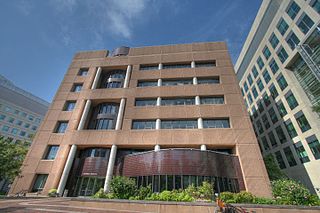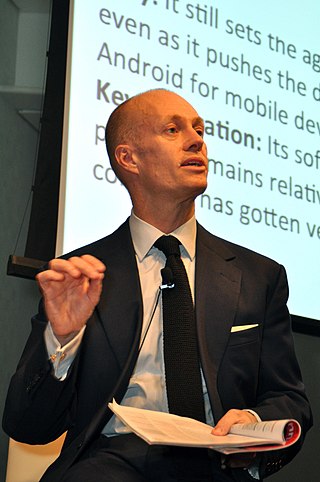
The Takeda Pharmaceutical Company Limited is a Japanese multinational pharmaceutical company. It is the third largest pharmaceutical company in Asia, behind Sinopharm and Shanghai Pharmaceuticals, and one of the top 20 largest pharmaceutical companies in the world by revenue. The company has over 49,578 employees worldwide and achieved US$19.299 billion in revenue during the 2018 fiscal year. The company is focused on oncology, rare diseases, neuroscience, gastroenterology, plasma-derived therapies and vaccines. Its headquarters is located in Chuo-ku, Osaka, and it has an office in Nihonbashi, Chuo, Tokyo. In January 2012, Fortune Magazine ranked the Takeda Oncology Company as one of the 100 best companies to work for in the United States. As of 2015, Christophe Weber was appointed as the CEO and president of Takeda.

Whitehead Institute for Biomedical Research is a non-profit research institute located in Cambridge, Massachusetts, United States that is dedicated to improving human health through basic biomedical research. It was founded as a fiscally independent entity from the Massachusetts Institute of Technology (MIT), where its 19 members all hold faculty appointments in the MIT Department of Biology or the MIT Department of Bioengineering. As of 2023, Ruth Lehmann is its director; she succeeded David C. Page.

Robert Samuel Langer Jr. FREng is an American biotechnologist, businessman, chemical engineer, chemist, and inventor. He is one of the nine Institute Professors at the Massachusetts Institute of Technology.

Jason Matthew Daniel Pontin is a British-born venture capitalist and journalist. He is a General Partner at the venture capital firm of DCVC in Palo Alto, and is a board member and seed investor in a number of life sciences companies. He is the former editor in chief and publisher of MIT Technology Review.
Daphne Zohar is an American entrepreneur. She is the founder and CEO of Seaport Therapeutics, co-founder of Karuna Therapeutics, and Founding CEO of PureTech Health. She sits on the board of BIO and is a co-founder and host of Biotech Hangout.

David Berry is an American entrepreneur and business executive. He has co-founded Valo Health, Seres Therapeutics, Indigo Agriculture, Axcella Health, and contributed to the early development of Moderna.
Atlas Venture is an early-stage venture capital firm that creates and invests in biotechnology startup companies in the U.S. Atlas is headquartered in Cambridge, Massachusetts, where the majority of its investments are located. Atlas raised its thirteenth fund totaling $450 million in March 2022, after raising its Opportunity Fund II totaling $300 million in September 2021.

Jennifer Anne Doudna is an American biochemist who has pioneered work in CRISPR gene editing, and made other fundamental contributions in biochemistry and genetics. Doudna was one of the first women to share a Nobel in the sciences. She received the 2020 Nobel Prize in Chemistry, with Emmanuelle Charpentier, "for the development of a method for genome editing." She is the Li Ka Shing Chancellor's Chair Professor in the department of chemistry and the department of molecular and cell biology at the University of California, Berkeley. She has been an investigator with the Howard Hughes Medical Institute since 1997.

Moderna, Inc. is an American pharmaceutical and biotechnology company based in Cambridge, Massachusetts, that focuses on RNA therapeutics, primarily mRNA vaccines. These vaccines use a copy of a molecule called messenger RNA (mRNA) to carry instructions for proteins to produce an immune response. The company's name is derived from the terms "modified", "RNA", and "modern".

uBiome, Inc. was a biotechnology company based in San Francisco that developed technology to sequence the human microbiome. Founded in 2012, the company filed for bankruptcy in 2019 following an FBI raid in an investigation over possible insurance fraud involving the US health insurance program Medicare.
Calico Life Sciences LLC is an American biotechnology company with a focus on the biology of aging, attempting to devise interventions that may enable people to lead longer and healthier lives. It is a subsidiary of Alphabet Inc.

Henri A. Termeer was a Dutch biotechnology executive and entrepreneur who is considered a pioneer in corporate strategy in the biotechnology industry for his tenure as CEO at Genzyme. Termeer created a business model adopted by many others in the biotech industry by garnering steep prices— mainly from insurers and government payers— for therapies for rare genetic disorders known as orphan diseases that mainly affect children. Genzyme uses biological processes to manufacture drugs that are not easily copied by generic-drug makers. The drugs are also protected by orphan drug acts in various countries which provides extensive protection from competition and ensures coverage by publicly funded insurers. As CEO of Genzyme from 1981 to 2011, he developed corporate strategies for growth including optimizing institutional embeddedness nurturing vast networks of influential groups and clusters: doctors, private equity, patient-groups, insurance, healthcare umbrella organizations, state and local government, and alumni. Termeer was "connected to 311 board members in 17 different organizations across 20 different industries" He has the legacy of being the "longest-serving CEO in the biotechnology industry.

Editas Medicine, Inc.,, is a clinical-stage biotechnology company which is developing therapies for rare diseases based on CRISPR gene editing technology. Editas headquarters is located in Cambridge, Massachusetts and has facilities in Boulder, Colorado.
David Perry was the CEO and Director of Indigo Agriculture, an agricultural technology company headquartered in Boston, United States. He is a serial entrepreneur in the life sciences industry. He has co-founded Anacor Pharmaceuticals, Chemdex, NexPrise, Virogen and FareWell.

Greater Boston, primarily Boston and Cambridge, is home to more than 1,000 biotechnology companies, ranging from small start-ups to billion-dollar pharmaceutical companies. The many universities in the area give the region a large network of scientists.

Intellia Therapeutics, Inc. is an American clinical-stage biotechnology company focused on developing novel, potentially curative therapeutics leveraging CRISPR-based technologies. The company's in vivo programs use intravenously administered CRISPR as the therapy, in which the company's proprietary delivery technology enables highly precise editing of disease-causing genes directly within specific target tissues. Intellia's ex vivo programs use CRISPR to create the therapy by using engineered human cells to treat cancer and autoimmune diseases.
The Exploratory Science Center (ESC) is a pharmaceutical company based in Cambridge, MA. The disease agnostic research site was founded in 2016, and was led by Daria Hazuda until 2021. In late 2021 Juan Alvarez took on leadership as the interim head and Marc Levesque took on leadership in 2022. The Exploratory Science Center is a subsidiary of Merck & Co.
Flagship Pioneering is an American life sciences venture capital company based in Cambridge, Massachusetts that invests in biotechnology, life sciences, health and sustainability companies. Portfolio companies include Moderna, Indigo Agriculture, Inari Agriculture and Novomer. The firm both funds and incubates companies.
The Wyss Institute for Biologically Inspired Engineering is a cross-disciplinary research institute at Harvard University focused on bridging the gap between academia and industry by drawing inspiration from nature's design principles to solve challenges in health care and the environment. It is focused on the field of biologically inspired engineering to be distinct from bioengineering and biomedical engineering. The institute also has a focus on applications, intellectual property generation, and commercialization.












